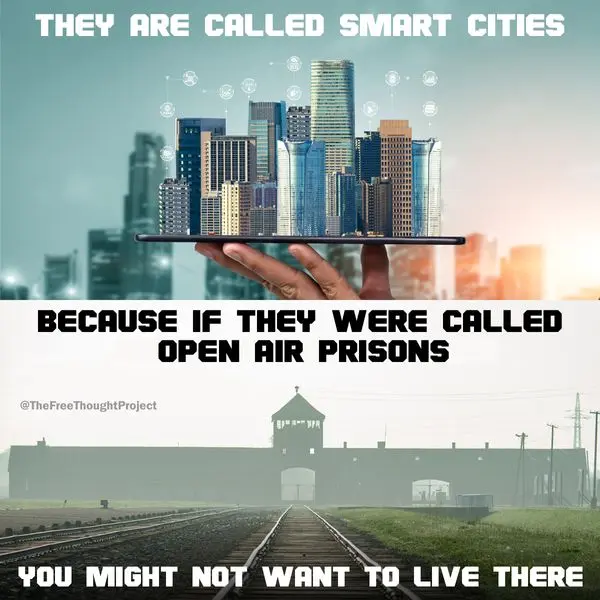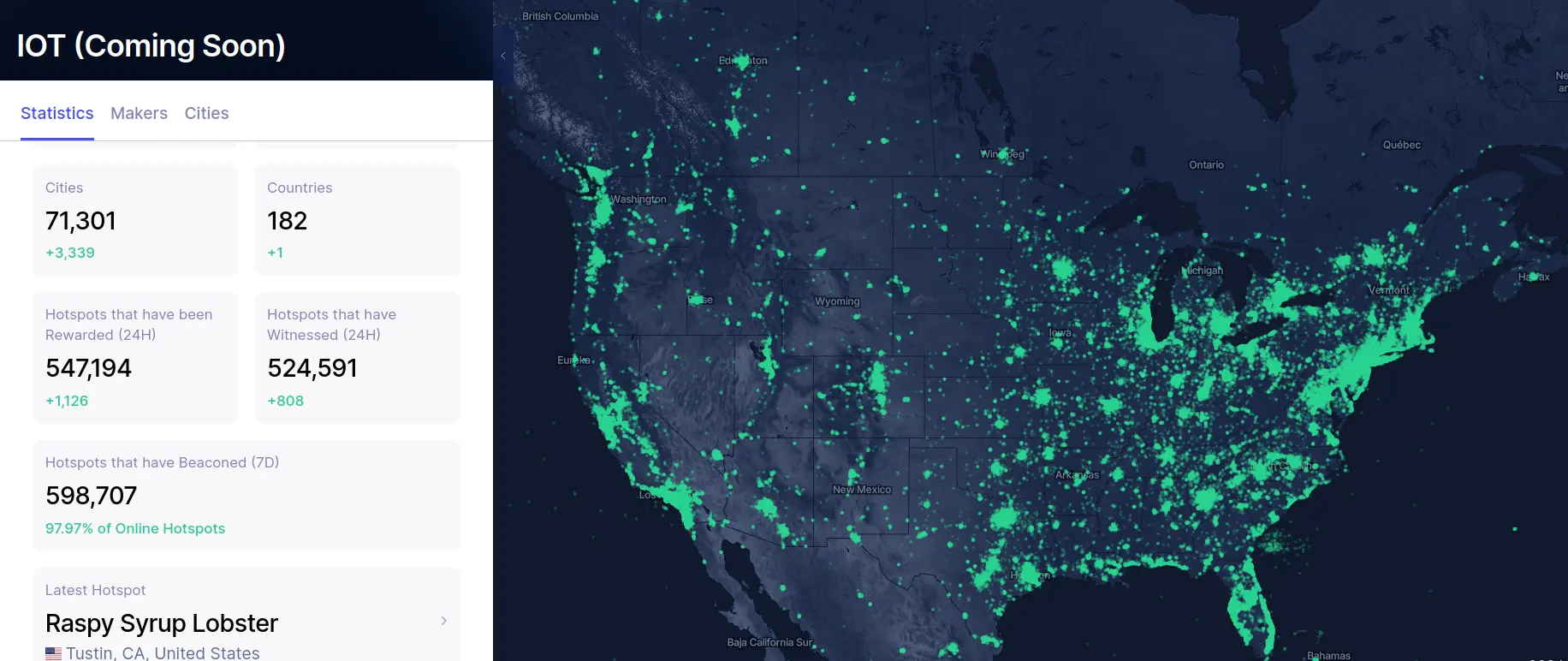Tools of the Technocracy: #7 Smart Cities
By Gabriel
Published: Aug 18 2022
Tools of the Technocracy Series
Technocracy
Smart Cities
Internet of Things
Surveillance
Voiceover
Tools of the Technocracy: #7 Smart Cities
What is a smart city?
Just like the ‘smart’ in smart devices is really just code for surveillance. A ‘smart’ city is really just a surveillance & control city. In essence, the smart city is the ultimate application of all the tools of the technocracy against it’s captives. Even the tone of their marketing gives off how much disdain they have for human beings.
ICENI Bulletins outlines the primary attributes of a smart city.
Attributes of a Future Smart City
It must be a planned community, laid out for high efficiency and short transit times. Practically everything one would need would be within walking distance of one’s apartment.
For many workers, telecommuting via the metaverse would replace physical commutes. One’s home would also be one’s workplace. Therefore, office space would be replaced with residential space, and practically everything along one’s commute - convenience stores, clothing shops, laundromats, coffeehouses, restaurants, et cetera - would be eliminated.
Physical services and many commercial areas would largely be replaced with on-demand and delivery services, including robo-delivery by drones or other unmanned vehicles.
Everything would be tightly regulated, with people’s utilization of services, consumption of goods, criminal activity, and other behaviors monitored by constant, all-encompassing surveillance.
This same surveillance system would be used to automatically dispatch emergency services, as required, by detecting ongoing crimes, medical emergencies, and fires, using all manner of networked sensors.
Networked sensors would also be used to determine electricity and natural gas usage, among other metrics of consumption and waste.
COVID-19 Deep Dive Part VII: Smart Cities and Neo-Malthusianism
So in short…
Why?
One of the most underestimated factors of the technocracy is the massive arms-race between the people and the technocrats. If people understood how essential the liberty they have left to their survival is they would have guarded it much more carefully during the Covid Crisis.
Data alone isn’t that valuable, it’s the ability to leverage it for power and control that has fueled the constant eradication of privacy in people’s lives. In many ways people choose to trade their privacy for convenience, but there are powerful incentives tipping the scales.
Smart cities are marketed as if they are for the convenience of its residents, but this couldn’t be further from the truth. Smart cities are built for efficiently monitoring and controlling all aspects of people’s lives. There are massive challenges in trying to monitor and control every minute detail in life.
There are only two ways to solve that problem:
- Build up more computing power, storage & bandwidth incurring greater energy, resource, and management costs.
- ‘Simplify’ the problem by limiting people’s freedom.
There are limits to how far you can go with #1. Management of more and more complexity can become an impossibility. Energy is also likely to be highly constrained for the near future. You only need a convenient pretext to get the public under your control to go along with #2.
What does #2 look like in practice?
-
If you don’t have the computation to store and calculate everyone attending social events, visiting family, and otherwise moving about?
Just stop them from moving around!
-
Can’t easily build the infrastructure to listen to everyone, everywhere, all the time?
Simply force them onto digital platforms you control!
-
Don’t want things like human understanding, mercy or charity dulling your harsh enforcement mechanisms?
Simply use machines to carry out the orders!
-
Tired of administrators being held accountable for decisions that impact people?
Deflect to the automatic system and claim it is for the greater good!
There are all kinds of ‘optimizations’ you can do when you decide to grab complete top-down control, and develop robust mechanisms to silence and discredit any dissent. This is why smart cities will resemble all the worst aspects of company towns.
It’s already started.
“Noah was a conspiracy theorist when it started to rain”
Dr Zelenko
An easy mistake to make when thinking about the tools of the technocracy, is to only recognize them in their most extreme and visible forms. Systems are gradually introduced and built on to construct what could be seen as impossible. While someday you may see drones enforcing edicts on street-corners, it’s a mistake to think that because there aren’t outright visible features, that the system isn’t already being built.
For cryptocurrency the 2010s were a decade of optimism and hope. The 2020s are where we get to see the real ‘double-edged’ aspects of these systems. Blockchain technology is efficient at administration and storing information. As you can see, helium is being used to roll-out IoT infrastructure.
There are many good uses for such a project, sadly, in our troubled times no tool is above political interference. There is a storm of attacks on anything resembling independent, censorship resistant communication/financial networks, even if they aren’t secure as they seem. It is important not to become overconfident or have too much faith in an individual product.
Digital ID
As far as a smart city is concerned, you aren’t human. You don’t have rights. You can’t own property. Your activities aren’t limited in terms of money, but rather permission. All your activities are constantly monitored and the system has the capability to intervene at any time.
To the smart city administration, you happen to be an animal that carries around a tool that represents you in the system. If carrying the tool is too burdensome it can be implanted.
Yes, the smartphone works as a digital ID. Your phone number and/or IMEI is enough to uniquely identify you in all kinds of situations.
Solutions
Boycott Digital ID
Reducing your dependence on surveillance devices is important. It is equally important to prevent people from being forced into using them. The more people locked into these systems, the less they are able to accept your refusal to participate.
In any and all circumstances it is best to refuse to divulge personally identifying information, especially with institutions and services you don’t trust.
This includes (but is not limited to):
- Full name
- Location data & home address
- Phone Number
- E-mail address
- Credit card details
- Government ID
Vitally important is to support the great local organizations working to protect freedoms in your area. The Take Action Crowdfund is a fantastic resource for finding initiatives to support.
Get involved
By May 2020, Sidewalk had pulled the plug, citing “the unprecedented economic uncertainty brought on by the covid-19 pandemic.” But that economic uncertainty came at the tail end of years of public controversy over its $900 million vision for a data-rich city within the city.
It’s hardly unusual for citizens to get up in arms about new development, and utopias fail for all sorts of reasons. But the opposition to Sidewalk’s vision for Toronto wasn’t about things like architectural preservation or the height, density, and style of the proposed buildings—the usual fodder for public outcry. The project’s tech-first approach antagonized many; its seeming lack of seriousness about the privacy concerns of Torontonians was likely the main cause of its demise.
Almost everything the technocrats want to force on people are impossible without the compliance of the public. Do not fall for the trap of believing these changes are inevitable. We can all work to shape the world we want, and the most important part is getting connected and engaged in your community. It’s important to build and maintain systems and infrastructure that strengthens communities.
Work to prevent an all-digital financial system.
Catherine Austin Fitts (Solari.com) and Children’s Health Defense have a fantastic series Financial Rebellion that regularly discusses strategies to prevent total top-down control of the financial system. One of these strategies is #CashEveryday
Independent long-range communications
Establishing ‘off-grid’ communication networks to bypass censorship will be a dire necessity once the capability exists to completely segregate locations from the Internet. As technology improves, so does the ability to counteract censorship.
Sharing is caring!
Please send this post to anyone you think might be interested.
If you haven't already, don't forget to bookmark this site!
You can always subscribe with the RSS feed or get posts sent to your inbox via Substack.


